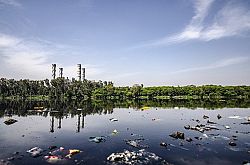

A study published in the journal Environmental Science & Technology has claimed that chemical pollution has passed a safe limit for humans. This level of pollution threatens the stability of global ecosystems, which is particularly bad news for humans as we rely on such ecosystems to sustain life.
Plastics, combined with around 350,000 synthetic chemicals including pesticides, are a particular concern. For instance, plastic pollution has been found at the top of Mount Everest. An American explorer, Victor Vescovo, also found a plastic bag at the bottom of the Mariana Trench in 2019 - the deepest place in the ocean. It is the presence of these chemicals in the environment that is pushing the earth beyond stability, claims the study.
Chemicals have the ability to damage biological and physical processes. Pesticides, for instance, may also kill non-target insects such as bees, which disrupts ecosystems. Considering humans are a big part of our natural ecosystems, and also a significant influence over them, it is vital that we play our part in ensuring that the ecosystems which support us are protected and enhanced, not damaged.
Whilst it is difficult to determine a safe limit for chemical pollution because there is no baseline data or precedent, the researchers used a combination of measurements for their study, including rate of chemical production - which has increased by fiftyfold since 1950 - and release of chemicals into the environment. Patricia Villarrubia-Gomez, a PhD candidate who was part of the study team, said "The pace that societies are producing and releasing new chemicals into the environment is not consistent with staying within a safe operating space for humanity."
Once all of their data was combined and analysed, including looking at the impact of extracting fossil fuels to produce the chemicals, the researchers decided that their evidence pointed towards a breach of the planetary boundary. Professor Bethanie Carney Almroth, part of the research team, said "There’s evidence that things are pointing in the wrong direction every step of the way. For example, the total mass of plastics now exceeds the total mass of all living mammals. That to me is a pretty clear indication that we’ve crossed a boundary. We’re in trouble, but there are things we can do to reverse some of this."
Measures to reverse the impact include embracing the circular economy in order to reuse more materials. Strong regulation can also help, including a cap on chemical production and release.
Alarmingly, the chemical pollution planetary boundary is the fifth of nine boundaries that scientists have concluded have been crossed. The others crossed include global warming, biodiversity loss, destruction of habitats and excessive nitrogen and phosphorus pollution.